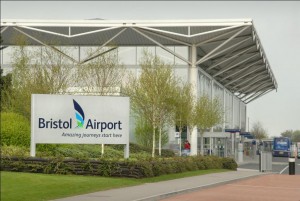Bristol Airport boss Robert Sinclair today outlined a five-point plan to boost regional air travel as a way of easing congestion in the South East and overcoming the political wrangle over a third runway at Heathrow.
Launching the report at a high-profile air travel industry event in London, Mr Sinclair said, if implemented, its key suggestions would deliver real benefits for regional airports like Bristol, the wider economy and passengers across the country. He urged the Government to market regional airports to overseas tourists while prioritising rail links to them.
Entitled Giving wings to airports across the UK, the report also recommends making best use of existing capacity in the regions to ease congestion in the South East.
In the foreword Mr Sinclair, Bristol Airport chief executive, says: “As politicians, Government officials, aviation professionals and other stakeholders debate issues around capacity and new schemes costing billions of pounds, it is critical to remember that significant airport capacity already exists in the UK regions.
“Government policy should encourage the use of this capacity and should encourage private sector investment in long-term infrastructure. Not only will this relieve congestion at airports in the South East, but it will help rebalance the economy at the same time.
“Like many airports outside London, Bristol Airport is very well placed to create jobs and drive economic growth in its region. What we need is a very clear and very tangible aviation policy which supports growth and investment.”
Bristol Airport, the UK’s ninth largest airport and the fifth largest outside London, handled 5.8m passengers last year and has planning permission to further develop its facilities to take 10m by 2020.
The ‘positioning paper’, which is in response to the Government’s consultation on its Draft Aviation Policy Framework, was being launched today at the Airport Operators Association (AOA) Annual Conference in London. Bristol Airport also has submitted a formal response to the Framework.
The Government has appointed former Financial Services Authority chief Sir Howard Davies to head an independent commission which will make its full report on airport capacity needs in summer 2015.
Expansion at Heathrow – which is operating at full capacity – is proving an increasingly political issue. Some commentat ors believe previous Transport Secretary Justine Greening – who met Bristol Airport bosses in June on a visit to the city – was moved because of her opposition to the highly-controversial idea of a third runway at Heathrow.
ors believe previous Transport Secretary Justine Greening – who met Bristol Airport bosses in June on a visit to the city – was moved because of her opposition to the highly-controversial idea of a third runway at Heathrow.
Expansion at Gatwick and Stansted is also being studied – although both would encounter major problems. London Mayor Boris Johnson, among others, is backing plans for a new airport in the Thames Estuary.
Bristol Airport’s five recommendations in today’s report are:
1. Rebalancing the economy
To deliver the forecast growth in UK air passengers and spread the benefits of connectivity more evenly across the UK, aviation policy must provide clear support for specific growth proposals at airports in the regions. Without an explicit Government policy directive, critical decisions affecting regional economic growth risk becoming bogged down in local planning disputes. Action is also required to make best use of existing capacity outside London. While it is airlines who decide which routes are operated from which airports, a range of policy levers and fiscal measures should be employed to ensure best use is made of existing airport capacity.
- Investing in surface access improvements
Government policy should prioritise transport proposals that would deliver short, medium and long-term improvements in surface access to airports outside London in order to drive economic growth within the regions. Links to nearby airports should be a key consideration when assessing applications for funding of new transport schemes, and integration of rail and air services must be central to the assessment of rail franchise replacement bids. The scope of the Department for Transport’s review of rail access to airports should be extended beyond those airports named in the Draft Aviation Policy Framework and widened to include road transport.
3. Supporting inbound tourism to the regions
The Government’s tourism strategy should encourage international visitors to use airports in the regions as gateways to the UK. The proximity of regional attractions to local airports with access to international connections should be highlighted in marketing materials promoting the UK overseas. Priority should also be given to airports outside London when considering initiatives, such as US pre-clearance, which would increase their appeal to international passengers. Similarly, where this would provide benefits to inbound passengers, Government agencies should consider piloting other innovative technology and processes at airports in the regions.
- Promoting travel policies which embrace airports in the regions
Private and public sector organisations should be encouraged to revise travel policies to, where possible, favour the use of airports in the region in which they are located. This would deliver a combination of time, cost and emissions savings, while also relieving congestion at London airports. Government should also address the anomaly whereby passengers on domestic flights linking far-flung regions of the UK pay double the tax of those making return trips to destinations in other European countries.
- Maintaining ‘light touch’ regulation in the aviation sector
The Government should act decisively to reduce the regulatory burden and costs for airports. Additional regulatory costs act as a drag on efficiency and should be avoided wherever possible. Regulation should avoid a ‘one size fits all’ approach, with the characteristics of individual airports taken into consideration when framing any limits or guidelines required. A Joint Task Force should be formed to enable airports to work with Government to identify areas where red tape could be removed.
Mr Sinclair will be taking part in a panel debate on Promoting Regional Development at the AOA Annual Conference today.



















